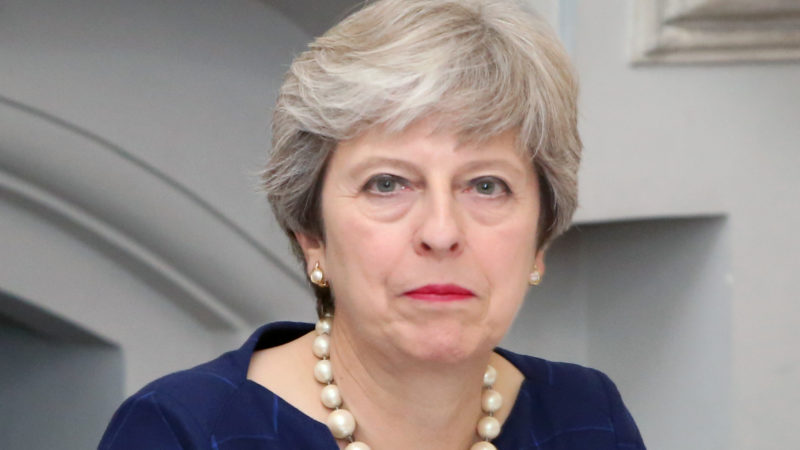One woman attempted suicide after the government slashed her income

Content warning: Sexual violence, suicide and abuse
Keen not to make ‘go home’ vans and Brexit chaos her only legacies, Theresa May has often claimed that the fight against Modern Slavery is her personal crusade – but her government slashed victims’ income, pushing one woman to attempt suicide.
After introducing a Modern Slavery Act, strategy and taskforce she wrote in The Telegraph:
“Together with my successor as Home Secretary, we will hold regular meetings in Downing Street with every relevant department present to get a real grip of this issue right across Whitehall and to coordinate and drive further progress in the battle against this cruel exploitation.”
What she and her successors Amber Rudd and Sajid Javid actually went on to do was cut the weekly benefits to asylum-seeking victims of trafficking from £65 a week to £37.75 a week, affecting more than 1,000 people.
One of those people was a 30-year old Albanian woman who (according to the Guardian) fell into the hands of sex traffickers after refusing to marry a man her family had selected for her. She was brought to London, drugged and raped seven to eight times a day
According to Wilson’s Solicitors, who represented her in a recent court case:
“As a result [of her abuse] she suffers from depression and PTSD. Since the cuts, she was no longer able to afford to travel to therapy, vocational training and mentoring which were helping her to build a more positive future, with skills that would mitigate the risks of re-exploitation. She became socially isolated and attempted suicide.”
Despite everything she had been through though, she and a 19-year old Sudanese man summoned up the strength to take the government to court to challenge the cuts – and they won.
The judge ordered the government not just to reverse the cuts but to pay back all the money they had taken from trafficking victims.
As well as making life miserable for people who’ve already been through more than most of us can imagine, these kind of cuts make it harder for people to escape trafficking.
The Albanian woman’s lawyer, Nusrat Uddin said:
“The cuts undermine efforts to defeat modern slavery by making victims more vulnerable at a crucial time when they are meant to be supported to recover and escape the influences of the traffickers.
For over eight months, our client has been denied all the services vital for her recovery from her past traumatic experiences. It is not a simple road to recovery for victims of trafficking and modern slavery. Many of our trafficking clients are too fragile to start formal treatment or are waiting for a long time before counselling or therapy is available.
It is crucial that support groups and activities are accessible in order to empower victims to move forward in their recovery. The cuts prevented our client’s from maintaining contact with her support network or attending her counselling and vocational activities.
It made her feel powerless again and she felt so hopeless about her future that she attempted suicide.”
The government seems to have decided not to appeal the decision. Paying expensive lawyers to keep fighting rather than give just £1m or so to some of the most vulnerable people in the country seems to have been a step too far, even for them.
A Home Office spokesperson said: “Modern slavery is an abhorrent crime and the Government is clear that we will do all we can to tackle this issue. We have introduced world-leading legislation in the Modern Slavery Act, which gives law enforcement agencies the tools to target perpetrators, and expanded the support available to victims.
“We are committed to reforming the National Referral Mechanism to ensure victims of modern slavery get the support they need. We accept the court judgment and will set out our response in due course.”
Joe Lo is a freelance investigative journalist and writes for Left Foot Forward. He tweets here.
To reach hundreds of thousands of new readers and to make the biggest impact we can in the next general election, we need to grow our donor base substantially.
That's why in 2024, we are seeking to generate 150 additional regular donors to support Left Foot Forward's work.
We still need another 124 people to donate to hit the target. You can help. Donate today.



